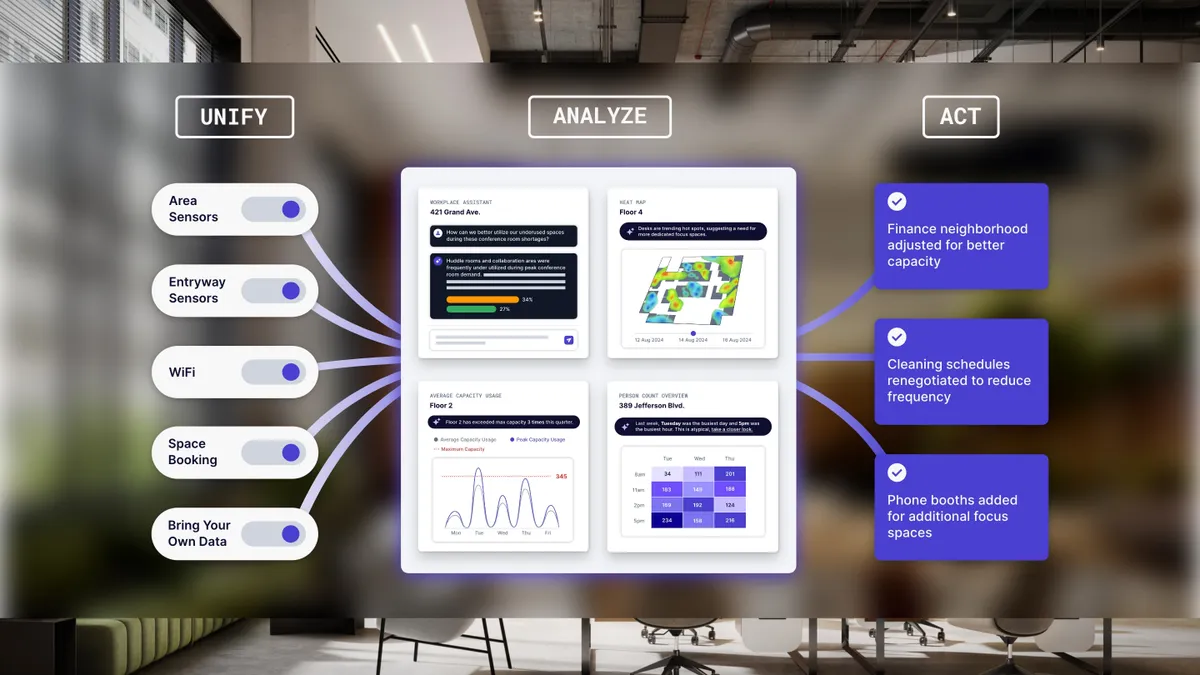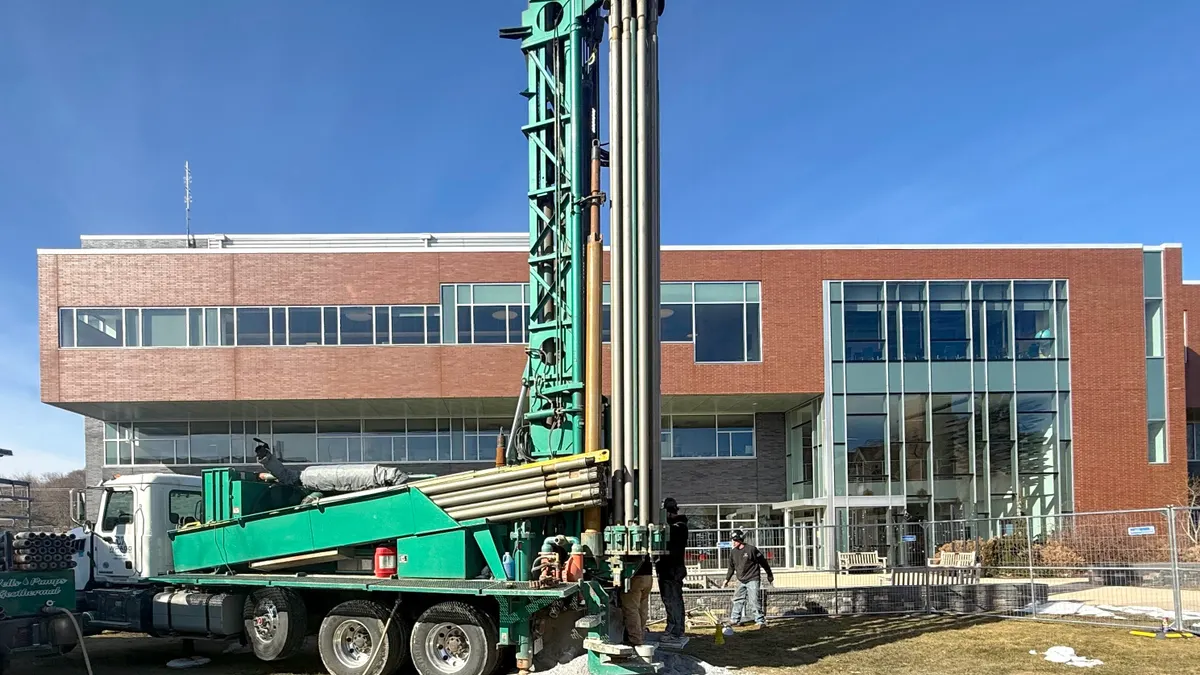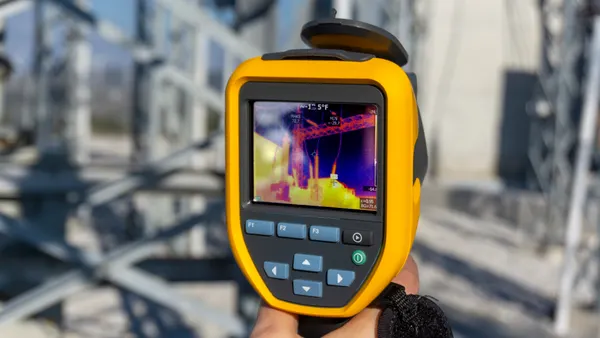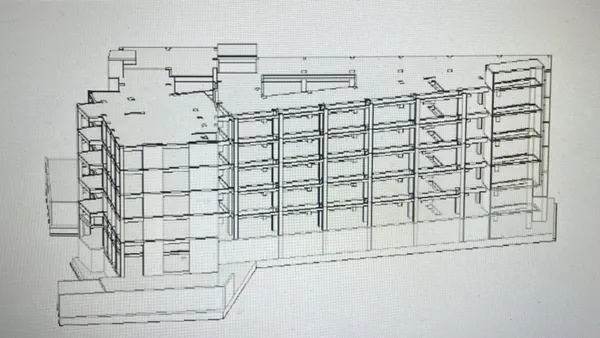Dive Brief:
- VergeSense has updated its Occupancy Intelligence platform, unifying data from various existing building systems to provide operators with occupancy insights, the company announced Tuesday.
- The platform will now be able to access and analyze WiFi data, space booking systems and other asset sensor data, enabling operators to understand trends across a portfolio, the company said. By comparing booking trends with actual space use from area sensors, operators can optimize their most expensive spaces with precision, VergeSense says.
- “Facilities teams can leverage floor and neighborhood-level insights from WiFi data to deactivate specific spaces on the days with historically low usage, allowing them to reduce energy consumption and operational costs,” VergeSense CEO Dan Ryan said in an email. “As granular space usage insights become necessary for more sophisticated neighborhood planning and space design decisions, workplace leaders can add area sensors, unify all of their data into a single platform, and make more confident decisions that drive efficient operations and better employee experiences.”
Dive Insight:
Companies’ real estate portfolio plans have shifted in the past year, with 38% of respondents surveyed by CBRE saying they expect their portfolios to grow, compared with 20% who cited such expectations in 2023. While 58% of large companies with over 10,000 employees say they will likely trim their footprint over the next three years, 80% of smaller companies with fewer than 1,000 employees expect that they will need more space in that time, according to CBRE’s 2024 Americas Office Occupier Sentiment survey, which polled 225 corporate executives.
As a result, occupiers are prioritizing technology such as enhanced video conference tools, room and space booking software, smart building systems and occupancy sensors to better connect hybrid workforces and make space planning more predictable, the survey found.
“Space booking data is crucial for workplace management because it provides visibility into the difference between planned and actual space usage. When unified with occupancy data … it enables workplace leaders to identify patterns, such as no-show bookings or underutilized spaces, and make adjustments to space booking policies accordingly,” Ryan said. “Leaders can also leverage space booking automation to auto check-in or release space based on human presence or absence in a space, freeing up more available space. This allows for better space planning, increased efficiency, and a frictionless employee experience by ensuring that the right spaces are available when needed.”
The Occupancy Intelligence platform provides support for space booking and other data through integrations for more than 50 technology providers including Cisco, Eptura, Planon, Robin, Schneider Electric, Microsoft and Google, VergeSense says on its website, noting that operators can operate and automate workflows to save time, reduce costs and improve employee experience.
The platform’s latest incarnation allows the automatic booking and release of meeting spaces as teams move throughout the office, with area sensors detecting human presence and autoreleasing conference rooms with ghosted bookings.
The Occupancy Intelligence platform is also designed to integrate with various building automation and control systems, Ryan said. For example, by utilizing granular space utilization insights, “operators can move to usage-based cleaning schedules and only clean spaces that have been recently used to drastically reduce cost,” he said. Ryan noted that a VergeSense customer who integrated the platform with Switch Automation was able to align their cleaning schedule with annual space usage and ultimately renegotiated a 50% reduction in the cleaning schedule, garnering $2 million in savings.
VergeSense’s newly launched Workplace Assistant can analyze data from other existing building systems, such as badge data and passive infrared motion sensors, with uploaded data providing actionable recommendations and insight in minutes, the company says. The AI-powered feature is designed to provide personalized guidance based on attendance, efficiency and space shortage trends, helping operators “quickly capitalize on optimization opportunities,” per the release.
Operators can thus spend “less time manually analyzing data across disconnected systems, and more time experimenting, iterating and optimizing,” VergeSense said in the release.
Its Occupancy Intelligence platform is now available to businesses, VergeSense said. The company will host a webinar for a walkthrough of the platform on Oct. 8.











